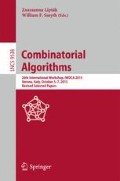Abstract
The klam value of an algorithm that runs in time \(O^*(f(k))\) is the maximal value k such that \(f(k)<10^{20}\). Given a graph G and a parameter k, the k -Leaf Spanning Tree ( k -LST) problem asks if G contains a spanning tree with at least k leaves. This problem has been extensively studied over the past three decades. In 2000, Fellows et al. [FSTTCS’00] asked whether it admits a klam value of 50. A steady progress towards an affirmative answer continued until 5 years ago, when an algorithm of klam value 37 was discovered. Our contribution is twofold. First, we present an \(O^*(3.188^k)\)-time parameterized algorithm for k -LST, which shows that the problem admits a klam value of 39. Second, we rely on an application of the bounded search trees technique where the correctness of rules crucially depends on the history of previously applied rules in a non-standard manner, encapsulated in a “dependency claim”. Similar claims may be used to capture the essence of other complex algorithms in a compact, useful manner.
Access this chapter
Tax calculation will be finalised at checkout
Purchases are for personal use only
Notes
- 1.
A connected dominating set is a subset \(U\subseteq V\) such that the subgraph of G induced by U is connected and every vertex in \(V{\setminus }U\) is a neighbor of a vertex in U.
- 2.
Problematic vertices in whose examination we cannot rely on such a fact will be handled by a “marking” approach—we will be able to consider our treatment of them as better than it is, since we previously considered the treatment of the vertices that marked them as worse than it is.
- 3.
For example, if \(T=(\{r,p,v,u,a,b,c\},\{(r,p),(p,v),(p,u),(r,a),(a,b),(b,c)\})\), and exactly before (after) p was inserted to T as an internal vertex, the tree was \(T_1=(\{r,p,a\},\{(r,p),(r,a)\})\) (\(T_2=(\{r,p,v,u,a,b\},\{(r,p),(p,v),(p,u),(r,a),(a,b)\})\)), then \(T'=T_2\) and \(\widetilde{T}=(\{r,p,a,b\},\{(r,p),(r,a),(a,b)\})\).
- 4.
In this context, recall that we need to avoid marking vertices when it is possible, since each marked vertex increases the measure.
References
Binkele-Raible, D.: Amortized analysis of exponential time and parameterized algorithms: Measure & conquer and reference search trees. Ph.D. Thesis, Universit\(\rm \ddot{a}\)t Trier (2010)
Binkele-Raible, D., Fernau, H.: A parameterized measure-and-conquer analysis for finding a \(k\)-leaf spanning tree in an undirected graph. Discrete Math. Theor. Comput. Sci. 16(1), 179–200 (2014)
Blum, J., Ding, M., Thaeler, A., Cheng, X.: Connected dominating set in sensor networks and MANETs. In: Du, D.-Z., Pardalos, P.M. (eds.) Handbook of Combinatorial Optimization B, pp. 329–369. Springer, New York (2005)
Bodlaender, H.L.: On linear time minor tests and depth-first search. In: Dehne, F., Sack, J.-R., Santoro, N. (eds.) Algorithms and Data Structures. LNCS, vol. 382, pp. 577–590. Springer, Berlin (1989)
Bonsma, P.S., Brueggemann, T., Woeginger, G.J.: A faster FPT algorithm for finding spanning trees with many leaves. In: Rovan, B., Vojtáš, P. (eds.) MFCS 2003. LNCS, vol. 2747, pp. 259–268. Springer, Heidelberg (2003)
Bonsma, P.S., Zickfeld, F.: Spanning trees with many leaves in graphs without diamonds and blossoms. In: Laber, E.S., Bornstein, C., Nogueira, L.T., Faria, L. (eds.) LATIN 2008. LNCS, vol. 4957, pp. 531–543. Springer, Heidelberg (2008)
Daligault, J., Gutin, G., Kim, E.J., Yeo, A.: FPT algorithms and kernels for the directed \(k\)-leaf problem. In: CoRR abs/0810.4946 (2008)
Daligault, J., Gutin, G., Kim, E.J., Yeo, A.: FPT algorithms and kernels for the directed \(k\)-leaf problem. J. Comput. Syst. Sci. 76(2), 144–152 (2010)
Douglas, R.J.: NP-completeness and degree restricted spanning trees. Discrete Math. 105(1–3), 41–47 (1992)
Downey, R.G., Fellows, M.R.: Parameterized computational feasibility. In: Feasible Mathematics, vol. II, pp. 219–244 (1995)
Downey, R.G., Fellows, M.R.: Parameterized Complexity. Springer, New York (1999)
Downey, R.G., Fellows, M.R.: Fundamentals of Parameterized Complexity. Springer, Heidelberg (2013)
Estivill-Castro, V., Fellows, M.R., Langston, M., Rosamond, F.A.: FPT is P-time extremal structure I. In: Proceedings of ACiD, pp. 1–41 (2005)
Fellows, M.R., Langston, M.: On well-partial-order theory and its applications to combinatorial problems of VLSI design. Technical report, CS-88-188, Department of Computer Science, Washington State University (1988)
Fellows, M.R., McCartin, C., Rosamond, F.A., Stege, U.: Coordinatized kernels and catalytic reductions: an improved FPT algorithm for max leaf spanning tree and other problems. In: Kapoor, S., Prasad, S. (eds.) FST TCS 2000. LNCS, vol. 1974, p. 240. Springer, Heidelberg (2000)
Kneis, J., Langer, A., Rossmanith, P.: A new algorithm for finding trees with many leaves. In: Hong, S.-H., Nagamochi, H., Fukunaga, T. (eds.) ISAAC 2008. LNCS, vol. 5369, pp. 270–281. Springer, Heidelberg (2008)
Kneis, J., Langer, A., Rossmanith, P.: A new algorithm for finding trees with many leaves. Algorithmica 61, 882–897 (2011)
Milenković, T., Memis̆ević, V., Bonato, A., Prz̆ulj, N.: Dominating biological networks. PLOSone 6(8), e23016 (2011)
Rai, M., Verma, S., Tapaswi, S.: A power aware minimum connected dominating set for wireless sensor networks. J. Network. 4(6), 511–519 (2009)
Raible, D., Fernau, H.: An amortized search tree analysis for k-leaf spanning tree. In: van Leeuwen, J., Muscholl, A., Peleg, D., Pokorný, J., Rumpe, B. (eds.) SOFSEM 2010. LNCS, vol. 5901, pp. 672–684. Springer, Heidelberg (2010)
Thai, M.T., Wang, F., Liu, D., Zhu, S., Du, D.Z.: Connected dominating sets in wireless networks with different transmission ranges. IEEE Trans. Mob. Comput. 6, 721–730 (2007)
Author information
Authors and Affiliations
Corresponding author
Editor information
Editors and Affiliations
Rights and permissions
Copyright information
© 2016 Springer International Publishing Switzerland
About this paper
Cite this paper
Zehavi, M. (2016). The k-Leaf Spanning Tree Problem Admits a Klam Value of 39. In: Lipták, Z., Smyth, W. (eds) Combinatorial Algorithms. IWOCA 2015. Lecture Notes in Computer Science(), vol 9538. Springer, Cham. https://doi.org/10.1007/978-3-319-29516-9_29
Download citation
DOI: https://doi.org/10.1007/978-3-319-29516-9_29
Published:
Publisher Name: Springer, Cham
Print ISBN: 978-3-319-29515-2
Online ISBN: 978-3-319-29516-9
eBook Packages: Computer ScienceComputer Science (R0)

